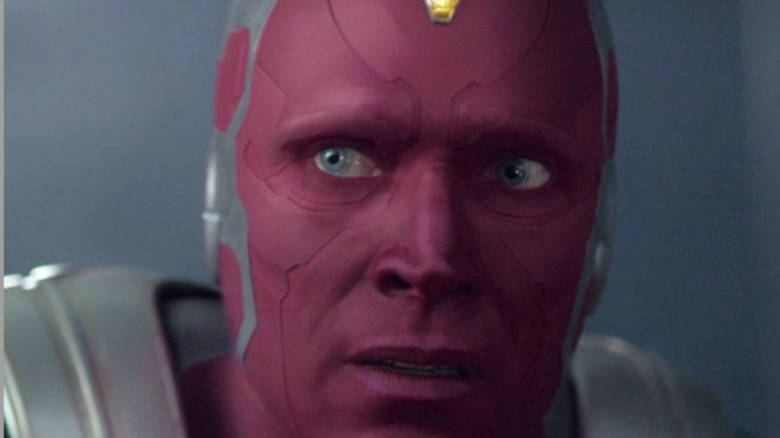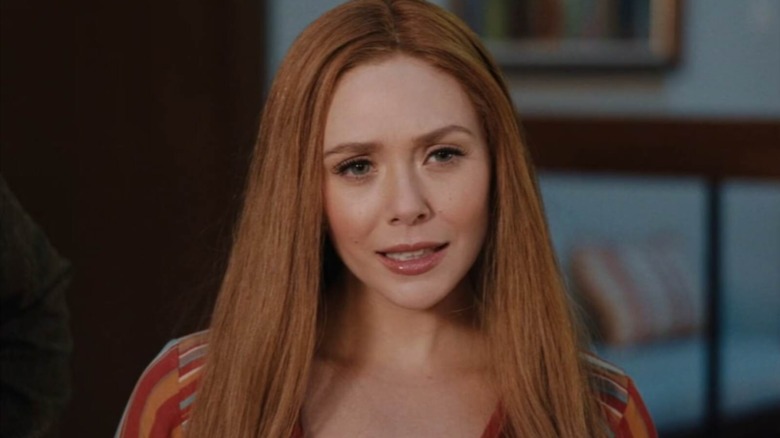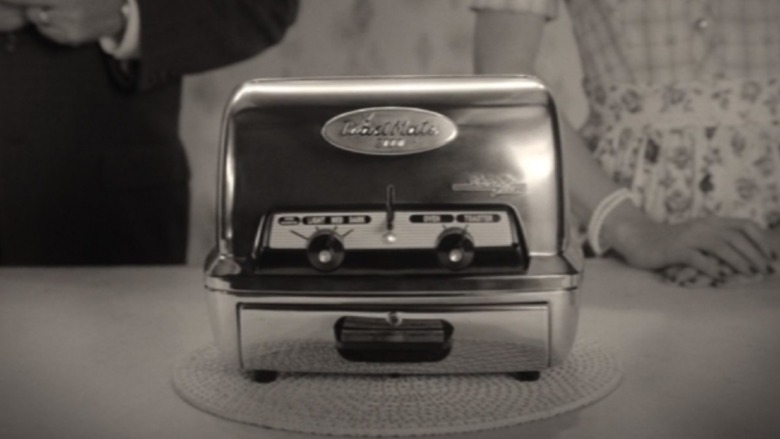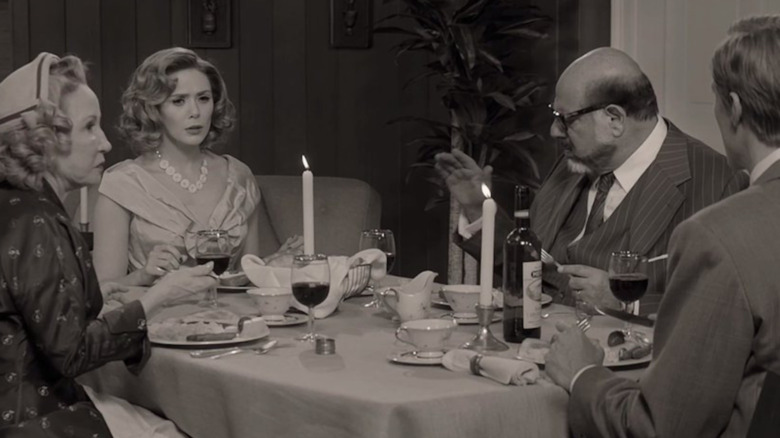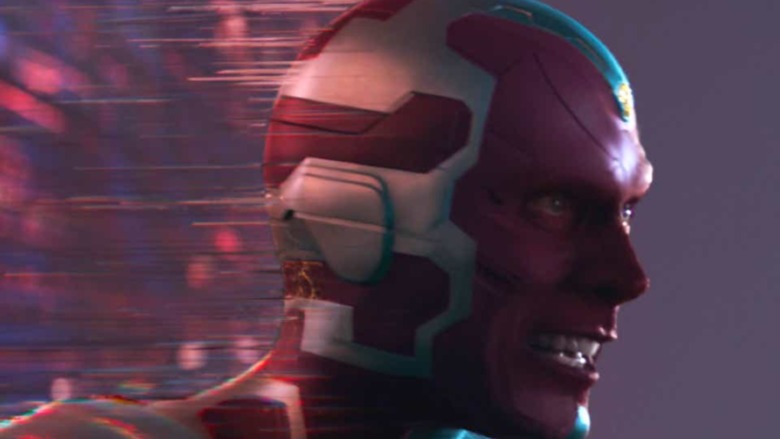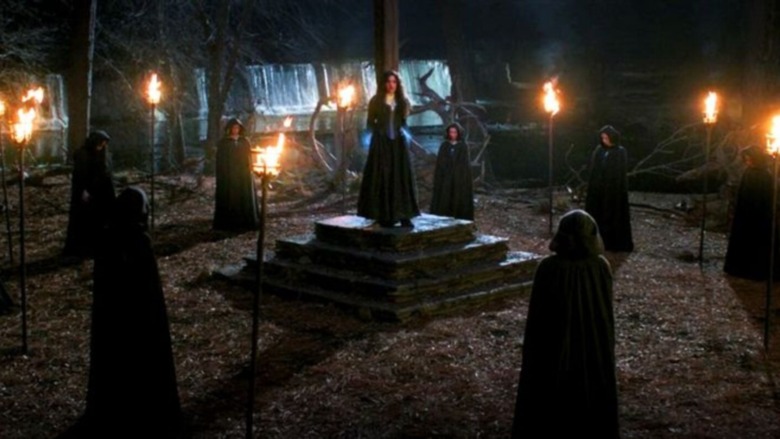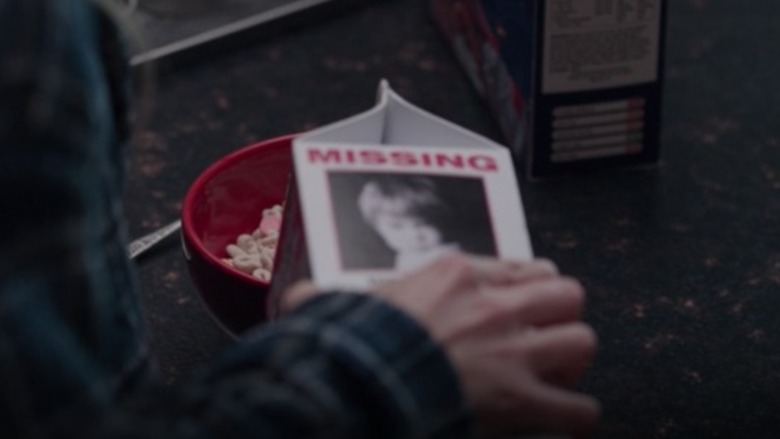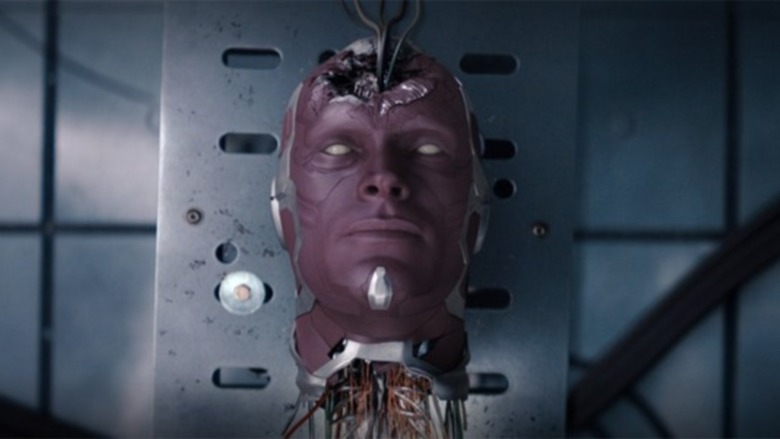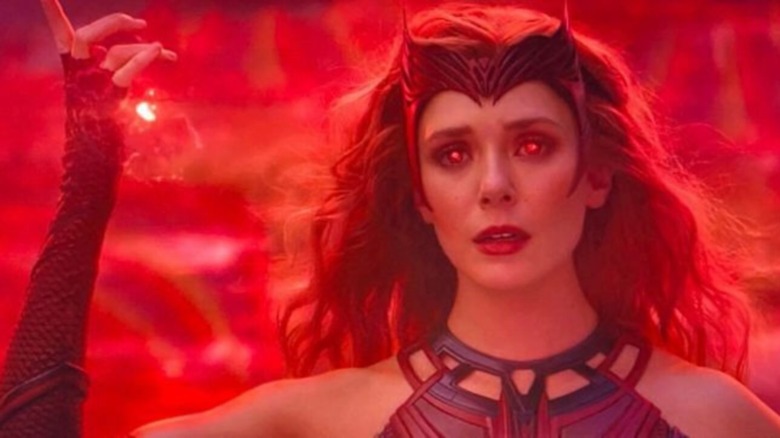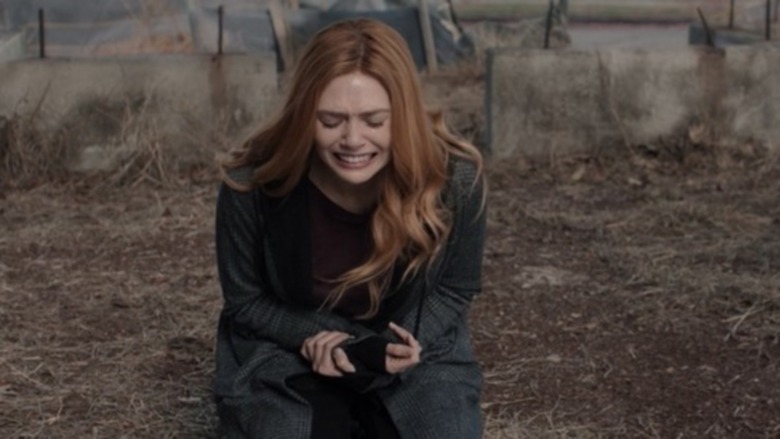Things You Only Notice In WandaVision After Watching It More Than Once
The Marvel Cinematic Universe took one of its biggest risks with "WandaVision", a strange, meta-sitcom-thriller-fantasy hybrid series that finally put Wanda Maximoff and her android boyfriend Vision at the center of the narrative. Starring Elizabeth Olsen and Paul Bettany in the titular roles, "WandaVision" was an immediate hit with audiences and critics, proving that MCU content can be just as entertaining to watch on your device via Disney+ as on the big screen.
"WandaVision" began as a homage to classic sitcoms through the ages, from "Bewitched" to "Malcolm in the Middle" to "Modern Family". But amidst all the sitcommy tropes and clichés of laughter tracks, nosey neighbors, and G-rated suburban hijinks, there were occasional hints that the shiny bright top layer of the show hid a dark and disturbing secret underneath. It soon became clear that something sinister was going on in the little town of Westview where Wanda and Vision had chosen to start their new life together.
At the center of the entire mystery was Wanda, a metahuman with more power than she was aware of, who had seen greater tragedy than almost anyone else in the MCU. As the story of "WandaVision" unfolded and warped around the legend of the so-called "Scarlet Witch", various hints and clues were scattered throughout the narrative for eagle-eyed viewers to pick up on. Here are twelve such hints that you might have missed upon the first viewing of the show.
Wanda's voiceover before each episode
New episodes of the show started with a brief recap of the previous episode, preceded by a voiceover by Wanda Maximoff (Elizabeth Olsen) intoning, "Previously, on 'WandaVision'." The voiceover seemed intended to be a cute reference to sitcoms that often do the same thing for multi-part episodes.
But as "WandaVision" progressed, audiences noticed that the level of enthusiasm that Wanda put into saying "Previously..." grew less and less with each new episode. This was not a coincidence. When the show started, Wanda was in complete control of the false reality she had created in the town of Westview, and everything within that reality was working smoothly, making her sound like a happy sitcom character with no real-world problems, which was the whole point of the illusion.
But with each new episode, Wanda's control over her new reality increasingly slipped away. Things began going wrong. Characters behaved differently from how Wanda wanted them to behave. Plotlines did not smoothly resolve at the end of each episode. And the threat of the real world grew ever closer to shattering Wanda's false domain. Thus, with each new "Previously, on 'WandaVision'," we could hear Wanda growing increasingly weary of trying and failing to keep everything perfect like in the first episode.
The Stark Industries toaster commercial
Possibly the most hotly debated aspect of "WandaVision", amongst all the homages, references and easter eggs, were the ads that appeared within the show's narrative. Who was making the ads? Why were they there in the first place? What significance did they have for the plot?
As it turned out, the ads were most likely a window into Wanda's subconscious psyche and her feelings over the past that were directly informing her present. While some of the ads were pretty self-explanatory regarding their meaning, let's take a look at the ones that may hold a deeper significance.
The first commercial we saw was for a Stark Industrial toaster. Despite what many fans assumed, this ad featured only a peripheral connection to Tony Stark, with whom Wanda never had a particularly close relationship. Instead the machine, built by Stark Industries, was a reference to the Stark Industrial bomb that fell into Wanda's home when she was a child.
The toaster in the ad blinked ominously with a red light, just like the bomb did before it exploded and almost killed Wanda and her brother Pietro. The sound of the toaster also resembled the sound of one of the repulsors from Tony's Iron Man suit. Through the ad, Wanda was reliving the single most traumatic moment of her life, one that set herself and her brother on the path to becoming test subjects for Hydra and transforming into metahumans.
The Strucker watch commercial
The second commercial was for a Strucker watch. This time, during the episode's events Wanda had been dwelling on the part of her life that saw her become a tool for Hydra, the secret organization that wanted to use the mind stone to create a new breed of superhumans.
The word "Strucker" was a reference to Hydra leader Baron von Strucker, who we watched being taken down by the Avengers at the start of "Avengers: Age of Ultron". He was the man who conducted the tests on Wanda and her brother which gave them their powers. The ad also underlined the importance of Hydra in Wanda's life. For a brief moment, the camera zoomed in on the logo for Hydra, which had been carved into the face of the watch.
The fact that the Hydra logo was smaller and less noticeable than the "Strucker" name might have been a reference to Wanda and Pietro not being initially aware of the evil organization that Baron Strucker was working for. This tied into the feelings of guilt and shame that Wanda experienced upon discovering that she was working for villains — first Hydra, and then Ultron.
The Hydra Soak bath soap commercial
The third commercial was for "Hydra Soak" bath soap, and it continued Wanda's preoccupation regarding her time spent working for Hydra. As the name suggests, "Hydra Soak" is used to wash away things that you find to be undesirable.
Hydra, of course, is well-known for using brainwashing techniques that leave subjects their helpless slaves. While we got to see the effects of this brainwashing most prominently on Bucky Barnes, aka The Winter Soldier, it is possible Hydra did something similar to Wanda and her brother during the experimental procedures that they performed on the Maximoff twins to unlock their abilities.
The ad could also have been a reference to Wanda's own powers, which in the beginning relied almost exclusively on mind-controlling those around her. This particular ability had not been used much in the MCU since "Avengers: Age of Ultron", but made a comeback in the last episode of "WandaVision". Finally, we heard the announcer remark, "escape to a world all your own, where your problems float away." This could have been referring to both what happened when Wanda and Pietro tried to escape from Sokovia in search of a better life, and what was currently happening in Westview.
The commercial for Lagos paper towels
With the fourth commercial for a paper towel brand called "Lagos", we seemed to be moving away from Wanda's time with Hydra to her time as an Avenger, which was also filled with plenty of anguish and heartbreak. This time, Wanda's focus did not seem to be on what Hydra did to her, but on her own regrettable actions.
During the commercial, we heard the slogan, "For when you make a mess you didn't mean to," which was likely a reference to when Wanda accidentally destroyed several floors of an office building filled with people in Lagos in "Captain America: Civil War," which in turn led to the creation of the Sokovia Accords, and the fracturing of the Avengers into Team Captain America and Team Iron Man.
One of the liquids we saw the paper towel clean up looked an awful lot like blood. This reflected Wanda's guilt over her actions in Lagos, and her desire to rectify her mistakes and make everything better again. It was this same impulse that ultimately drove Wanda out of her mind, leading her to create the sitcom reality of "WandaVision", where nothing ever would go wrong and every episode could end with a happily ever after.
When Mr. Hart started choking
In the first episode of "WandaVision", Vision's boss Mr. Hart (Fred Melamed from "A Serious Man") came over for dinner along with his wife (Debra Jo Rupp from "That '70s Show"). In the middle of the typical sitcom hijinks, Mr. Hart suddenly collapsed to the floor, choking on a piece of food. All Mrs. Hart did while her husband was choking was repeatedly say "Oh, stop it!", as though Mr. Hart was playing a prank. Meanwhile, Wanda sat frozen with indecision, while Vision watched helplessly until she ordered him to save Mr. Hart.
That scene displayed the dangerous amount of power Wanda wields in Westview. Since Mrs. Hart is under Wanda's control, she was not allowed to go off-script and cry over her husband almost dying. When she said "Stop it!", she was not speaking to her husband, but begging Wanda to put a stop to the whole charade and save Mr. Hart.
Meanwhile, Wanda was so focused on keeping up the illusion of the sitcom world that she could not even bring herself to assist the man dying in front of her. Vision, a hero in his own right, was also so completely under Wanda's spell that all he could do was mutely look at her and wait for her to tell him what to do.
The significance of the Halloween episode
On sitcoms, Halloween episodes are often a chance to shake up the established formula for the show and bring a new, darker tone to the proceedings. "WandaVision" took this sitcom lesson deeply to heart in a game changing plotline about Wanda's time in Westview, while Vision set out to uncover the secrets of the town by attempting to go outside of it.
When Vision did finally find the magic barrier separating Westview from the rest of the world, his attempts to phase through the barrier came with mixed results. It did not turn out well for him because Vision is actually dead. His body can only exist inside Westview, and when he attempted to leave the town, he began to disintegrate.
The fact that this entire sequence took place on Halloween night gave it a special significance. Traditionally, Halloween (and the older pagan festivals on which it is based) is seen as a time of dark magic, when the spirits of the dead can enter the real world. The story arc of this "spirit" version of a dead Vision, was brought back to life using Wanda's brand of dark magic and trying to enter the world of the "living" from within the confines of Westview, was a quite literal interpretation of Halloween tradition.
When Agnes talked about out of control kids
Without a doubt, the breakout character of "WandaVision" was Agatha all along.
Played by Kathryn Hahn, her "Agnes" was originally set up as the nosey but helpful neighbor that every sitcom requires. But as the story progressed, we realized that Agnes had a much more important, and much more sinister role to play on the show.
When we finally learned the truth about Agnes aka Agatha, some of her earlier lines took on a whole new meaning. For instance, when referencing Wanda's children at one point, Agnes remarked: "Kids...you just can't control 'em, no matter how hard you try." At the time, it seemed Agnes was referring to Wanda's children. But, she was actually talking about herself.
This is because we came to learn that Agnes used to be a witch named Agatha, who was a part of a coven of witches centuries ago, that included her mother as the head of the coven. When Agnes was caught reading forbidden magic texts, her mother punished her, even trying to kill her. Instead, Agnes took her mother's life and killed her entire coven to gain more strength. In retrospect, clearly Agnes knows a thing or two about being the kind of kid that parents cannot control.
When Agnes joked about biting children
Let's continue to focus on Agnes for a second, and her witty one-liners that became much more disturbing once you factor in the fact that she is a vampire witch who killed her own mother for power.
At one point, Agnes made a throwaway remark about having bitten a child once. The line was played for laughs, as an example of Agnes being her usual quirky self. Until you remember that Agnes is a witch, and in many tales of witches over the centuries, there is a popular notion that they eat people, particularly children, like the witch in Hansel and Gretel.
To make matters worse, that same episode featured a dark moment that did not fit into the idyllic world of Westview that Wanda had created. In one scene, we saw a missing child photo on a milk carton.
Wanda would most likely never allow a child to come to harm inside her reality, but Agnes was not under Wanda's control, as she had managed to sneak into Westview. It is entirely possible that Agnes had something to do with that missing child, bringing an extra edge to that line about biting children.
The purpose of Project Cataract
While Wanda and Agnes were busy warring over their use of magic, the team from SWORD that had come to observe Westview were more interested in the new version of Vision keeping Wanda company.
Hayward (Josh Stamberg), the director of SWORD, hoped to use the magical energy generated by Westview to bring Vision's original android body back to life. The entire mission to make it happen was named "Project Cataract". That name might seem pretty random, but it actually makes perfect sense if you consider what Hayward was trying to do.
Why do people get cataract operations? So they can get their "Vision" back. Also, when you have advanced cataracts, a white layer of film covers your eyes. This is similar to the white look of Vision's eyes after he died at the hands of Thanos. Later, when the version of Vision under Hayward's custody was revived, the whites of his eyes turned back to normal, meaning that "Project Cataract" had achieved success in reviving Vision.
Wanda's journey to becoming the Scarlet Witch
"WandaVision" chronicles Wanda's attempts to cope with the loss of Vision, but the show is also a stepping stone for Wanda to become the mythical "Scarlet Witch". Agatha Harkness was the first one to inform Wanda that she was actually Scarlet Witch, a fact that Wanda vigorously denied.
However, even as Wanda was trying to justify the reasons why she could not possibly be the Scarlet Witch, her own words and experiences proved her wrong. Agatha began by saying that a Scarlet Witch was "Not born but is forged." This was in keeping with Wanda's backstory, where she had been born with some powers, but did not achieve her true potential until she came into contact with the Soul Stone.
Next, Agatha revealed that the Scarlet Witch had no coven. This also was consistent with Wanda's experience, as she thought she was one of a kind, and had no one to talk to who could do the things she could. Finally, Agatha declared that the Scarlet Witch would have no need for spells or incantations. Once again, we know that Wanda was able to use her magic without any need for spells, or even any magical amulets like Doctor Strange.
Covering the five stages of grief
Jac Schaeffer, the creator of "WandaVision", has often spoken about how the show is essentially a story of coping with past trauma and loss. In keeping with this theme, the entire arc of the show can be broken down into the five stages of grief across nine episodes.
The first two episodes cover "Denial". In these episodes, Wanda was firmly insistent upon the "perfect" reality of Westview where nothing ever went wrong. Episodes three and four were about "Anger". This was where Wanda's perfect reality became threatened by Agatha and SWORD. Wanda's response was to quickly and violently quell these attacks, even sending Monica Rambeau hurtling out of Westview.
In the fifth and sixth episodes, Wanda grappled with "Bargaining" to keep her perfect reality intact. The most literal example of this was when Wanda warned the SWORD team, "You don't bother me; I won't bother you." Later, another moment of bargaining occurred when Pietro tried to convince her that the people of Westview were suffering under Wanda's rule.
The seventh and eighth episodes covered "Depression." We saw that Wanda had grown listless and apathetic, refusing to get out of bed, taking pills, and reliving her most traumatic memories under Agatha's orders. All this led to the grand finale of "WandaVision", which explored the final stage of dealing with grief, "Acceptance." Wanda finally accepted her role as the Scarlet Witch, and that her actions in Westview had led to great hardships on the residents.
